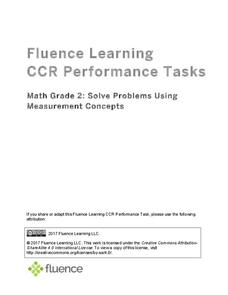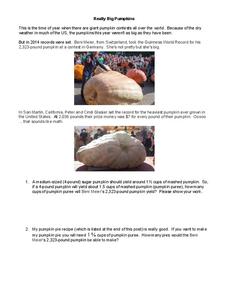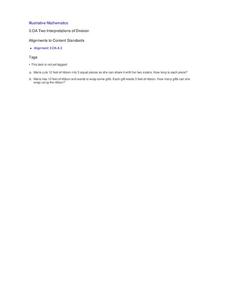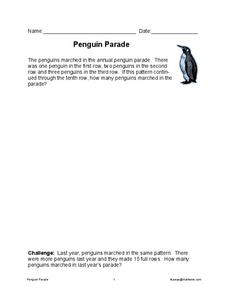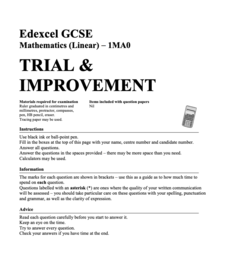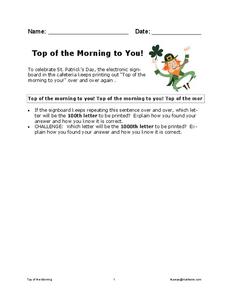EngageNY
Putting the Law of Cosines and the Law of Sines to Use
Use the Law of Cosines and the Law of Sines to solve problems using the sums of vectors. Pupils work on several different types of real-world problems that can be modeled using triangles with three known measurements. In the process,...
Fluence Learning
Solve Problems Using Measurement Concepts
Young mathematicians demonstrate what they know about measurement with a four-task assessment that focuses on estimation, length, and inches.
Yummy Math
Really Big Pumpkins
You may think your holiday pumpkins weigh a ton, but in a giant pumpkin contest, they actually do! Middle schoolers read about the winners of the 2014 giant pumpkin contests before solving three word problems involving multiplication and...
Illustrative Mathematics
Two Interpretations of Division
Division can be seen in two ways; as splitting a whole into a certain number of pieces, or splitting it into pieces of a certain size. Help your class reach this understanding with these two simple word problems. Encourage the use of...
University of Utah
Simultaneous Linear Equations
Solve simultaneous linear equations, otherwise known as systems of linear equations. Pupils practice solving systems of linear equations by graphing, substitution, and elimination. The workbook provides a class activity and homework...
Worksheet Web
Learning About Rate
After reading a one-page passage on how to understand and solve distance/rate problems, young mathematicians answer six word problems that have them correctly set up the formula in order to solve for the distnace, rate, or time in the...
Mr. Waynes clas
Kinematics Objectives
Accelerate young physicists' learning with this collection of problem-solving worksheets. Starting off by teaching students to identify the given information and variables in physics problems, this resource goes on to challenge them...
EngageNY
Bacteria and Exponential Growth
It's scary how fast bacteria can grow — exponentially. Class members solve exponential equations, including those modeling bacteria and population growth. Lesson emphasizes numerical approaches rather than graphical or algebraic.
Math Wire
Penguin Parade
Make way for the penguin parade! Based on a given pattern of penguins in an ascending number of rows, how many penguins were marching this year? Learners solve two word problems to find the answer.
Charleston School District
Scientific Notation Operations
How do you operate with numbers in scientific notation? The resource provides examples on how to divide and multiply with numbers written in scientific notation. The handout and video also cover the procedure for addition and subtraction...
Mathematics Assessment Project
Creating Equations
Using equations to model events. The resource contains four items that prompt individuals to write and solve basic equations. They must reason abstractly and quantitatively while attending to precision when solving the problems.
HHS Math
Assignment 1.6: Solving Quadratic Equations
Practice solving different types of quadratic equations with these three worksheets. Problems include equations already factored, simple square root problems, and problems requiring different factoring techniques where the highest degree...
Curated OER
Mental Math: Multiply Multiples of 10, 100, and 1,000 homework 21.1
Pupils use basic facts and patterns to find the products of multiples of tens, hundreds, and thousands. They solve twelve problems.
EngageNY
End-of-Module Assessment Task: Grade 7 Mathematics Module 6
Determine the level of understanding within your classes using a summative assessment. As the final lesson in a 29-part module, the goal is to assess the topics addressed during the unit. Concepts range from linear angle relationships,...
Mathed Up!
Trial and Improvement
Try to find an estimate when the exact answer is not clear. Using the General Certificate of Secondary Education Math review resource, pupils learn how to find an estimate to a cubic equation. Class members use the trial-and-improvement...
West Contra Costa Unified School District
Talking About Distance, Rate and Time
Connect the tortoise and the hare fable to mathematics. Learners first identify key terms related to distance, rate, and time. They then solve distance/rate/time problems using different representations.
Illustrative Mathematics
Plastic Building Blocks
Let's build a castle! Dennis and Cody have big plans, but do they have enough blocks between the two of them to accomplish their goal? A great context that requires students to add and compare mixed numbers. Encourage the use of pictures...
Mathwire
Top of the Morning to You!
O' Lucky charms! its time for a leprechaun riddle to challenge your learners. So kick those heels in the air and river dance your way to solving this stimulating St. Patrick's Day math question.
Curated OER
Probability Crossword
Make probability fun and test your learners' knowledge of math probability vocabulary. Print out this crossword puzzle and see if they know enough about outcomes and experiments to fill in the blanks. The answer key is attached in...
Curated OER
Problem Solving: guess and check
In this guess and check activity, students use the strategy guess and check to solve math word problems containing one and two digit numbers. Students complete 6 problems.
Curated OER
Problem Solving Strategies: Pre Test
In this problem solving worksheet, students answer multiple choice questions about math word problems and choosing the best strategy to solve them. Students answer 10 questions total.
Curated OER
Problem Solving Strategy Practice: Guess and Check
For this guess and check worksheet, students solve 5 word problems using guess and check and show their work. Houghton Mifflin text is referenced.
Curated OER
Problem Solving Using Algebraic Equations
In this problem solving learning exercise, students are presented with how four numbers are related and then asked to solve for these four numbers. The solution, using algebraic equations, is provided.
Curated OER
Leveled Problem Solving: Circle Graphs
In this circle graphs activity, learners solve 6 word problems based on a circle graph about the most popular classes for sixth graders. Students calculate angle measures of circles for 2 of the problems.

